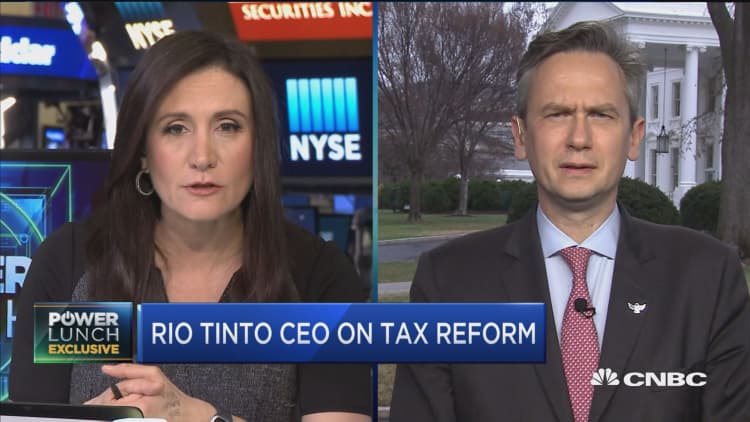
The new corporate tax cuts in the United States can make a "massive difference" when it comes to deciding where to make business investments, the CEO of global mining company Rio Tinto told CNBC on Friday.
Based in Australia and London, the company has 3,200 employees in the U.S. Rio Tinto supplies one-third of all aluminum in the U.S. and 13 percent of the country's copper, Jean-Sebastien Jacques said in an interview with "Power Lunch."
"We have some real options as we speak in terms of further investment in copper and further investment in aluminum in Canada as well," he said.
Rio Tinto process "a lot" of aluminum in Canada, with the bulk of it sent to the U.S., Jacques said.
"We are a capital intensive business," he added. "When we make an investment it's usually 25 years to 40 years."
Jacques was part of the Australian delegation visiting the White House on Friday and participated in a meeting with White House economic advisor Gary Cohn. While he wouldn't disclose the details of the meeting, he said infrastructure was a big part of the conversation.
"We love infrastructure," he said, pointing out that Rio Tinto would like to support it "in a big way."
"If you have more infrastructure requirements, you are going to need more copper, you are going to need more aluminum," he said. "We are here. … We have more investment, potentially."
Australian Prime Minister Malcolm Turnbull was expected to bring up infrastructure as part of his meeting with President Donald Trump on Friday.
The first world leader to be received at the White House in Trump's second year, Turnbull was set to propose using a portion of funds in Australia's nearly $2 trillion pension fund to invest in U.S. infrastructure. He was also expected to try to convince the U.S. to rejoin the Trans-Pacific Partnership.
— CNBC's Kayla Tausche and Stephanie Dhue contributed to this report.


